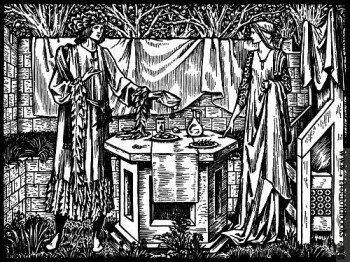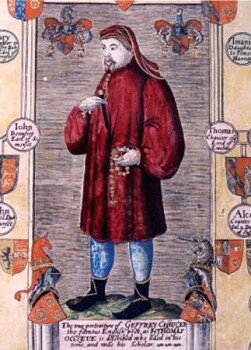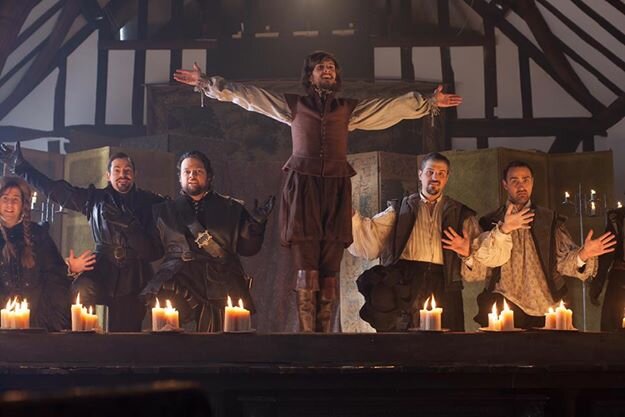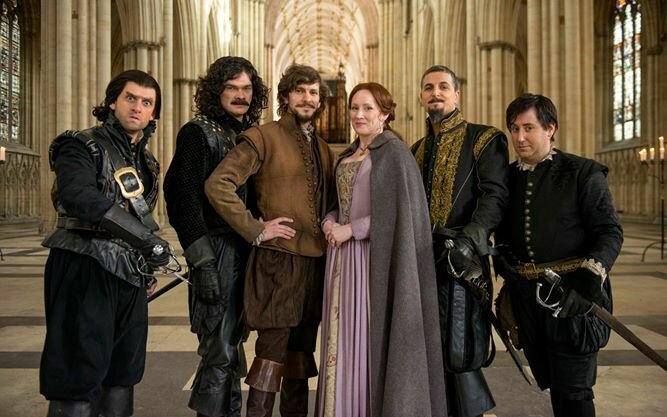It’s a mistake to call Geoffrey Chaucer a (proto-)feminist, if only because doing so would tend to align him with ideas about women’s role in society that would never have occurred to even the most liberal medieval writer. But there’s no mistaking where his sympathies lie in Troilus and Criseyde, his retelling of a classical story that he explicitly dedicates to women who don’t have a voice. While medieval  convention prevents him from changing the most important points of the plot, Chaucer rejects the tendency of every other version—later including Shakespeare’s—to make Criseyde the villain of the piece. Instead, he challenges readers to rethink their assumptions about an otherwise strong woman caught in a no-win situation with no power to decide her own fate.
convention prevents him from changing the most important points of the plot, Chaucer rejects the tendency of every other version—later including Shakespeare’s—to make Criseyde the villain of the piece. Instead, he challenges readers to rethink their assumptions about an otherwise strong woman caught in a no-win situation with no power to decide her own fate.
Chaucer first introduces the reader to Criseyde, the most beautiful woman in Troy, and then to Troilus, son of King Priam and a jerk who constantly makes fun of lovers. Finally, Eros gets mad and shoots Troilus just as he spies Criseyde at a public celebration. She sees him staring at her and frowns, which sends him into paroxysms of lovesick silliness.
But Criseyde is a widow in a society with strict standards of decorum and in which women have no rights and few freedoms. Worse, her father is a traitor recently banished from Troy for aiding the Greeks, and all his kin are sentenced to death; only her plea to Hector gains her clemency. Though she cherishes what independence she has, her livelihood is entirely dependent on the protection of her uncle Pandarus, who is a member of the royal household.
Pandarus is also a master manipulator who will stop at nothing to stay on Troilus’ good side. And if that means bullying Criseyde into an affair with the prince, he has zero qualms about doing so.
 Chaucer hints at this ruthlessness toward the end of Book II, when Pandarus takes Criseyde a letter from Troilus. She tries to refuse it, but he brushes off her objections and stuffs the letter down the front of her dress. When she succumbs to his insistence that she reply, Troilus pressures Pandarus into pushing the courtship even further… until at last, one dark and stormy night, Pandarus all but throws them into bed together and sleeps outside the door to ensure the tryst is both secret and successful. Criseyde curses Pandarus the next morning for putting her in this position, but she has finally convinced herself that she’s in love with Troilus.
Chaucer hints at this ruthlessness toward the end of Book II, when Pandarus takes Criseyde a letter from Troilus. She tries to refuse it, but he brushes off her objections and stuffs the letter down the front of her dress. When she succumbs to his insistence that she reply, Troilus pressures Pandarus into pushing the courtship even further… until at last, one dark and stormy night, Pandarus all but throws them into bed together and sleeps outside the door to ensure the tryst is both secret and successful. Criseyde curses Pandarus the next morning for putting her in this position, but she has finally convinced herself that she’s in love with Troilus.
Then, during a prisoner exchange in Book IV, Criseyde’s father asks Agamemnon to trade Antenor for her. Hector objects that Criseyde’s not a prisoner, but popular opinion persuades Priam to agree to the proposal. Troilus is understandably distraught, but he rejects Pandarus’ advice to move on or to rape Criseyde, declaring (for once) that he won’t do anything against her wishes. She likewise rejects any option other than going through with the exchange and escaping back to Troy as soon as she can. Both lovers pledge to remain true to each other while they’re apart.
 But Criseyde’s father prevents her from leaving camp to meet Troilus, and Diomedes decides to win her love for himself, offering her friendship and service at first. He doesn’t press when she tells him she can’t consider accepting a Greek lover, although he does continue to court her. And while Chaucer argues that she’s never really in love with Diomedes, he has to concede that she does eventually begin to favor Diomedes with gifts that had belonged to Troilus.
But Criseyde’s father prevents her from leaving camp to meet Troilus, and Diomedes decides to win her love for himself, offering her friendship and service at first. He doesn’t press when she tells him she can’t consider accepting a Greek lover, although he does continue to court her. And while Chaucer argues that she’s never really in love with Diomedes, he has to concede that she does eventually begin to favor Diomedes with gifts that had belonged to Troilus.
Yet when Troilus learns of Criseyde’s apparent unfaithfulness and Pandarus disavows her, Chaucer states that he’s writing this poem “most for wommen that bitraysed be / Through false folk.” And it’s not hard to see why. Hector and Diomedes appear to be the only men in Criseyde’s life who have any desire to look after her best interests rather than their own, and Pandarus, in particular, betrays her trust to coerce her into a relationship based solely on a prince’s lust. Even today, in the age of #NotAllMen and #YesAllWomen, Chaucer’s take on this story can prompt useful discussion about situations where true consent becomes impossible.
 Coleridge and Charles Lamb revived his reputation among the Romantics. Contemporary Thomas Carew went so far as to claim in an elegy that English poetry had died with Donne because no other poet would dare achieve the same level of originality and creativity. Nor was Donne renowned only for his poetry. After he was named a Royal Chaplain and later Dean of St. Paul’s Cathedral in London, he became known as one of the greatest preachers of his day. And
Coleridge and Charles Lamb revived his reputation among the Romantics. Contemporary Thomas Carew went so far as to claim in an elegy that English poetry had died with Donne because no other poet would dare achieve the same level of originality and creativity. Nor was Donne renowned only for his poetry. After he was named a Royal Chaplain and later Dean of St. Paul’s Cathedral in London, he became known as one of the greatest preachers of his day. And 


